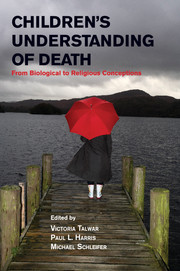Book contents
- Frontmatter
- Contents
- List of Figures and Table
- List of Contributors
- Preface and Acknowledgments
- 1 Death, Ancestors, and the Living Dead: Learning without Teaching in Madagascar
- 2 Death in Spain, Madagascar, and Beyond
- 3 Ambivalent Teaching and Painful Learning: Mastering the Facts of Life (?)
- 4 Death in the Lives of Children
- 5 Talking to Children about Death in Educational Settings
- 6 Responsible Believing
- 7 Thoughts and Feelings: Children and William James Have It Right!
- 8 How the Law Constructs Its Understanding of Death
- Index
Preface and Acknowledgments
Published online by Cambridge University Press: 03 May 2011
- Frontmatter
- Contents
- List of Figures and Table
- List of Contributors
- Preface and Acknowledgments
- 1 Death, Ancestors, and the Living Dead: Learning without Teaching in Madagascar
- 2 Death in Spain, Madagascar, and Beyond
- 3 Ambivalent Teaching and Painful Learning: Mastering the Facts of Life (?)
- 4 Death in the Lives of Children
- 5 Talking to Children about Death in Educational Settings
- 6 Responsible Believing
- 7 Thoughts and Feelings: Children and William James Have It Right!
- 8 How the Law Constructs Its Understanding of Death
- Index
Summary
CHILDREN'S UNDERSTANDING OF DEATH: FROM BIOLOGICAL TO RELIGIOUS CONCEPTIONS
This book examines different conceptions of death and their impact on children's cognitive and emotional development. It not only addresses practical and clinical issues related to children's developing understanding of death, but also focuses on theoretical and philosophical aspects linking children's concept of death to religion, morality, politics, and law. The material is drawn from a wide range of disciplines including psychology, anthropology, philosophy, medicine, education, and the law. This collection will be useful for courses in developmental psychology and clinical psychology, certain education courses, and philosophy classes – especially in ethics and epistemology. It will be of particular interest to researchers and practitioners in psychology, medical workers, and educators (parents and teachers).
The first three chapters of the book examine children's conceptions of death in different cultures. All three chapters focus on how children acquire a biological conception of death as well as how they acquire spiritual or religious ideas about an afterlife. Chapter 1, by Rita Astuti, provides an ethnographic account of how Vezo children living in a rural community on the western coast of Madagascar experience animal and human death. She describes how Vezo adults conceive of death and the life of the ancestors, how Vezo children are protected from ancestral threat, and how, as spectators to the rites and rituals that surround a death, Vezo children nevertheless construct an understanding of the ancestral afterlife.
- Type
- Chapter
- Information
- Children's Understanding of DeathFrom Biological to Religious Conceptions, pp. ix - xiiPublisher: Cambridge University PressPrint publication year: 2011



